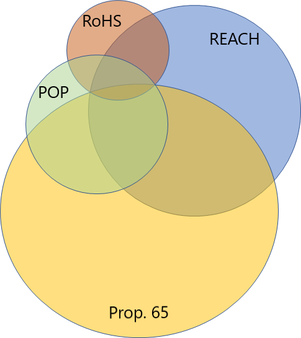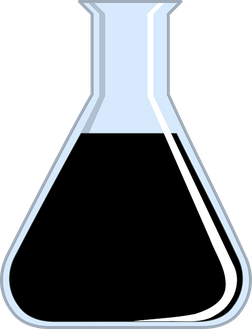| Substance Name |
CAS# |
Where used (examples) |
Where Regulated (examples) |
| Alkanes, C10-13, chloro (Short Chain Chlorinated Paraffins, SCCPs) |
85535-84-8 |
Flame retardant
Additive in metal working, in rubber, and plastics (e.g., cables) |
EU POP (Persistent Organic Pollutant)
EU REACH SVHC |
| Bisphenol A (BPA) |
80-05-7 |
Polycarbonate plastic, PVC
Epoxy resins
Thermal paper |
California Proposition 65
EU REACH SVHC |
| Cadmium
Lead |
7440-43-9
7439-92-1 |
Electrical and electronic equipment |
California Proposition 65
China, EU, Korean, Russia, Taiwan, Turkey, UK, Ukraine, United Arab Emirates RoHS
EU REACH SVHC and Annex XVII |
| DecaBDE – Decabromodiphenyl Ether
|
1163-19-5 |
Flame retardant |
China, EU, Korean, Russia, Taiwan, Turkey, UK, Ukraine, United Arab Emirates RoHS
EU POP
EU REACH SVHC
US TSCA-PBT |
| Diisobutyl phthalate (DIBP) |
84-69-5 |
Plasticizer |
EU RoHS
EU REACH SVHC and Annex XVII |
| Hexachlorobutadiene (HCBD) |
87-68-3 |
Solvent |
California Proposition 65
EU POP |
| Hexabromobiphenyl (HBB)
|
36355-01-8 |
Flame retardant |
China, EU, Korean, Russia, Taiwan, Turkey, UK, Ukraine, United Arab Emirates RoHS
|
| Pentabromodiphenyl ethers (PentaBDE) and its mixture
|
32534-81-9 and others |
Flame retardant |
California Proposition 65
China, EU, Korean, Russia, Taiwan, Turkey, UK, Ukraine, United Arab Emirates RoHS
EU POP |
| Tetrabromodiphenyl ethers |
40088-47-9 and others |
Flame retardant |
China, EU, Korean, Russia, Taiwan, Turkey, UK, Ukraine, United Arab Emirates RoHS
EU POP |




